最新北师大版高中英语课文Unit-15-Learning
北师大版高二上Unit15《Learning》(Lesson 2)ppt课件2
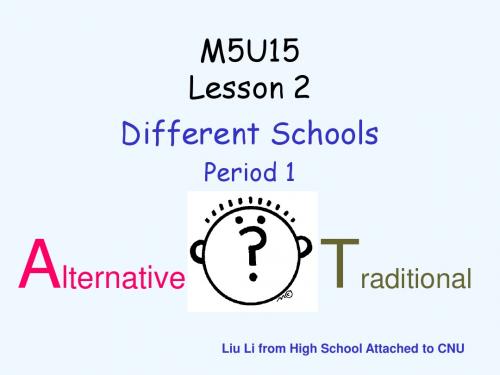
Ask your desk mate his/her questions to see if he/she can answer them.
Vocabulary learning: Ex. 4 P38
1. outstanding adj.
2. reflect vt. reflection n. 3. punish vt. punishment n. 4. reputation n. • to make sb. suffer because they have done sth. wrong. • the opinion of the public toward sb. or sth. • extremely good
You should finish your English grammar drills in the class.
你应该在课堂上完成语法练习。
2.motto: a short sentence or phrase that expresses a belief or purpose
• Some school mottos:
北师大版高中英语必修五Unit 15《Learning》(Lesson 2)ppt课件
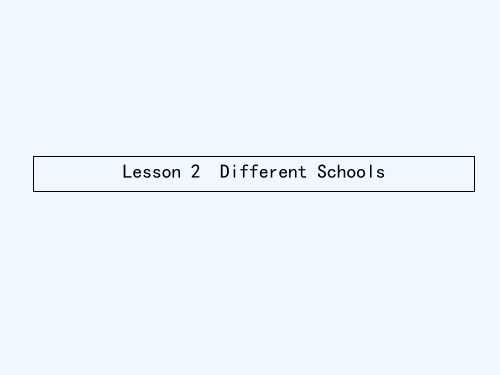
5.做某事
一
二
三
四
五
三、词性转换:按要求写出正确的单词
1.punish(v.)→ (n.) 2.slight (adj.)→ (adv.) 3.loose (adj.)→ (v.) 4.receive(v.)→ (n.) 5.reflect (v.)→ (n.) 6.select(v.)→ (n.) 7.misunderstand(v.)→ (n.) 8.simple(adj.)→ (v.) 答案:1.punishment 2.slightly 3.loosen 4.receiver 5.reflection 6.selection 7.misunderstanding 8.simplify
1
2
3
4
5
2.There were so many rules at that school and we had to obey them at all times! 学校有那么多规章,我们必须总是遵守! 考点 obey vt. 服从,听从 [高考典句](2014· 山东卷,C) She should always obey her owners’ orders. 她应该永远服从主人的命令。 Every student must obey the rules at school. 每个学生在校都必须遵守纪律。 He will lose his temper when children don’t obey him. 孩子们不听话,他就会发脾气。 归纳:obey 后直接接宾语,宾语可以是表示“命令、规章制度”等的名词,也可 以是表示人的名词、代词。
一
二
三
四
五
二、从课文中找出下列短语并翻译
1.be proud of 2.contribute to 3.participate in 4.hand out 5.approach to doing sth. 6.to a certain extent 7.prepare well for 8.in a bad mood 答案:1.为……感到自豪 2.促成,有助于 3.参加 4.给予 的方法 6.在某种程度上 7.为……准备好 8.心情不好
北师大版高中英语必修五Unit 15《Learning》(Lesson 5)ppt课件

3.其余的
4.总之
5.例如
6.为……做准
备
一
二
三
四
三、用所给单词的适当形式填空
1.She’s so (obvious) cleverer and prettier than I am. 2.I would like to express my (appreciate) and thanks to you all. 3.I find it really hard to drag myself out and exercise (regular). 4.I’ve come to the (conclude) that he’s not the right person for the job. 5.Her quick (adapt) to the new environment is admirable. 答案:1.obviously 2.appreciation 3.regularly 4.conclusion 5.adaption
一
二
三
四
四、根据括号内汉语提示完成下列句子
1. (住得离……远) my family and friends would be the biggest disadvantage. 2. (依我看), meeting people is very important in modern life. 3. (在一定程度上),it’s easier for men to get work. 4.I’m sorry, but I have to say that I (不懂你的意思) at all just now. 5. (最后),I would like to thank my husband. 答案:1.Living away from 2.As I see it 3.To a certain extent 4.didn’t get your point 5.In conclusion
英语:unit-15《learning》lesson-1-life-long-learning课件(1)(北师大版必修5)

The Importance of Life-long Learning
• 首都师大附中 • 雷霞辉
话题词汇 secure, suspect, status, qualification, lay off, instruct,
Name What did they study? Reason for study
Ms Tang business course be laid off and bored at home did a business course
How did they study?
Result of their study
About life-long learning, what famous sayings can you think of ?
Read the sub-title and predict the answers: (Group work)
• 1. What may Sun Wen aged 28 study? • 2. What may Ms Tang---- 45 years old study? • 3. What might Grandpa Chen---- 75 years old study?
Lesson 1 Life-long learning
The Importance of Life-long Learning
It’s never too late to learn. I tried to be a sponge, absorbing and questioning every good idea.
北师大高中英语模块五Unit-15-Learning-Lesson-1

Watch and decide: Do these people need to learn? People of all ages need to learn.
Life-long Learning
Unit 15 Lesson 1
The Importance of Lifelong Learning
Homework
In what ways will you take part in life-long learning after you finish school or university?
Sentences
Although he is a little boy, he knows much.
Quiz
随着国庆节假期的临近,很多学生打算去迪士尼乐 园,来放松和拓宽我们的视野。 With the National Day holiday drawing near, a large number of students are going to pay a visit to Shanghai Disney Resort, which will make us relax and broaden our horizons.
How important is it for people to continue the studies after formal education?
They are young, so they must work hard.
Only by keeping learning new things and developing new skills, can we keep up with the times and survive in such a competitive world.
高中英语 Unit 15 Learning课件 北师大必修5

assign
alternative
alternative
punishment
punish
reflect
reflection
slight
slightly
考纲知识预览
9. v.误解→ n.误解,误会→ v.理解,懂 10. n.接近或进入之路→ adj.(场所)易到达的,(事物)易到手的,(人)易接近的 11. adj.值得的→ adj.值得努力的→ adj.值,值得 12. v.缺乏,缺少,没有→ n.缺乏;匮乏;短缺→ adj.没有的,缺乏的
simplify
simple
suspect
suspect
suspicious
suspicion
instruct
instruction
instructive
考纲知识预览
4. n.作业;任务,工作→ vt.分配;指定,任命 5. adj.可选择的,另类的→ n.选择,替代物 6. n.惩罚,处罚→ vt.惩罚 7. vt.反映;反射→ n.反射;反省;想法 8. adj.少量的,微小的→ adv.稍微地,微小地
could phone
shouldn’t have been so
for me to go
名师一线讲坛
1. worthwhile adj. 值得努力的,值得花钱的,值得花时间的 (1)It is worthwhile to do/doing sth.值得做某事 (2)worth adj.值得…… be worth doing值得做 It is worth one’s while to do/doing...值得做……
名师一线讲坛
I began to suspect(that)they were trying to get rid of me. 我开始怀疑他们试图摆脱我。 They suspect him of murder. 他们怀疑他犯有谋杀罪。 What made you suspect her of having taken the money? 你凭什么怀疑钱是她偷的? The police arrested the suspect yesterday. 警方昨天逮捕了那个嫌疑犯。
北师大版高中英语必修五Unit 15《Learning》(Lesson 2)ppt课件
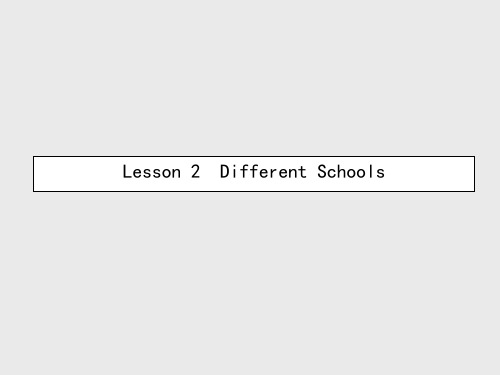
一
二
三
四
五
五、用方框中所给短语的适当形式填空(有两项是多余的)
fall behind get on with keep up with get together go over look up put off put on set up take up 1.That’s enough for now—let’s it tomorrow. 2.We have to work hard these excellent students. 3.Evans had rheumatic(风湿病引起的) fever,missed school and . 4.It’s believed that men tend weight in middle age. 5.Reading English most of my time every day when I was young. 6.“Yes,”he said, without even from the evening paper he had bought. 7.People to celebrate this festival. They gave the best wishes to each other. 8.The appointment because of his illness. 答案:1.get on with 2.to keep up with 3.fell behind 4.to put on 5.took up 6.looking up 7.got together 8.was put off
一
二
三
四
五
四、阅读下面的句子,用适当的介词填空
1.Sometimes we students study our own pace and the teachers seldom set tests. 2.Yesterday afternoon,she didn’t participate our discussion. 3.Our approach teaching is quite different from theirs. 4.I’m afraid that there is no excuse late work.You’ll be punished. 5. a certain extent, it’s easier for men to get work. 答案:1.at 2.in 3.to 4.for 5.To
unit15Learning课件(北师大必修5)
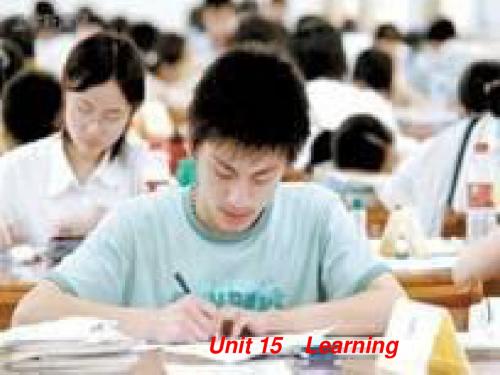
返回导航页
结束放映
栏目导引
词汇细解
inspiration n. 灵感 inspired adj. 受…影响的 inspiring adj. 激励人的
inspire sb to do sth 鼓励某人做某事 inspire sb in sth 使某人产生…
inspire
inspired lot of poets The beauty of the West Lake __________a to write _________their great poetry.
access 日照模拟 to接近……的机会,进入……的权利 (2013· )Frank put the medicine have/get/gain/obtain access to it would not in a top drawer to make sure (1) 得以接近,得以会见,得以进入 A be________to the kids. give access to 接见,准许进入 accessible adj.可到达的, A .accessible 可进入的,可理解的 B .relative (2) be accessible to 易接近的;能进入的; C . acceptable 易受影响的;可以理解的 D .sensitive
《金版新学案》
返回导航页
结束放映
栏目导引
词汇细解
(回归课本P40)The thing about being a teacher is that you have access to children’s minds when they are open and eager to learn.
英语北师大版必修5 Unit15《Learning》 warming up
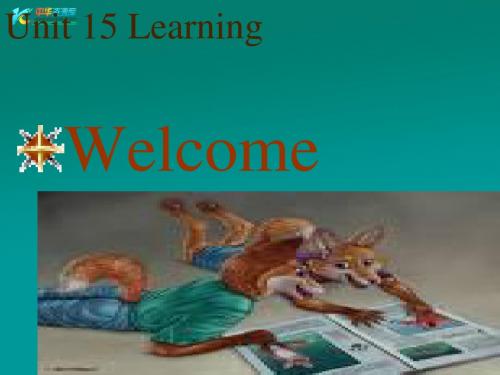
What is your intelligence type?(discuss with your partner using your choice above)
Visual/spatial intelligence Verbal/linguistic Intelligence Logical /mathematical Intelligence Bodily / kinesthetic Intelligence Musical/rhythmic Intelligence Interpersonal Intelligence Intrapersonal Intelligence
Choose three things that you are good at remembering or learning
Numbers:telephone numbers,dates,scores Sounds:voices ,pieces of music Machines:how to use and repair Images:what people wear,details or houses Actions:gestures,using your hands or body Places:names,directions People:names,faces Smells:places,food
Choose FIVE ways that you like best and discuss them with your partner
1. 1. 2. 2. 3. 3. 4. 4. 5. 5.
I like like remembering remembering words words in in these these I ways: ways: 1. 1. 2. 2.
高中英语北师大版高二上册《unit 15 learning 知识点》课件

reflection
(reflect) in the
完成句子 ③It is not the story itself but what is reflected in the story that counts. 重要的不是故事本身,而是故事里所反应的东西。
写作微练 ④当最后决定课程的时候到了时,我决定申请能反应我爱好的课程。
When the time came to make the final decision for a course, I decide d to apply for the one that reflected my interest.
点拨 (1)reflect sb./sth. in在……中映出某人/物的影像 reflect on sth.推敲/摸索某事 (2)reflection n.映像;摸索;反应 be lost in reflection陷入寻思中 reflection law反射定律
句式升级 ④Since failing in the exam, he has been devoted to his studies. →Since failing in the exam, he has been buried/absorbed/lost in his studies. →Since failing in the exam, he has been concentrating/focusing on his studies. →Since failing in the exam, he has been addicted to his studies.
点拨 bury oneself in(doing)sth.=be buried in(doing)sth.专心/埋头(做)某事 bury one's face in one's hands双手掩面 be buried in thought寻思;寻思 be buried in books埋头读书 【温馨提示】 表示“专心于”的多种表达参见Unit 12
最新北师大版高中英语必修五Unit 15《Learning》(Lesson 1)ppt课件1
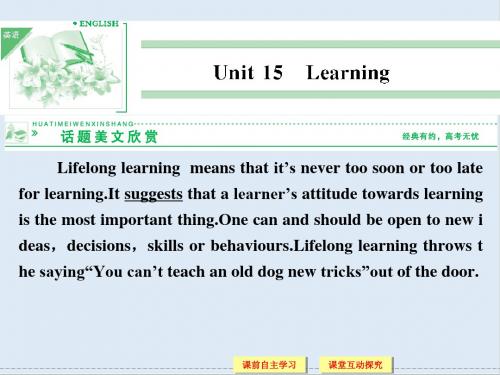
课前自主学习
课堂互动探究
Period One Warm-up & Lesson 1
Ⅰ.单词识记 1._o_x____n.a male cow 2._b_a_c_k_w_a_r_d_s_adv.towards a place or a position that is behi nd 3._si_m__p_li_f_y_vt.to make sth easier to do or understand 4._se_c_u_r_e___adj.likely to continue or be successful for a lon g time 5._su__sp_e_c_t__v.to be suspicious about sth
Lifelong learning means that it’s never too soon or too late for learning.It suggests that a learner’s attitude towards learning is the most important thing.One can and should be open to new i deas,decisions,skills or behaviours.Lifelong learning throws t he saying“You can’t teach an old dog new tricks”out of the door.
课前自主学习
Байду номын сангаас
课堂互动探究
6._s_t_a_tu_s___n.the social or professional position of sb/sth 7._c_h_i_e_f ___adj.most important,highest in rank 8._i_n_s_tr_u_c_t_v.to tell sb to do sth,especially in a formal o r official way 9._b_u_r_y____v.to place a dead body in a grave 10.d_i_s_ti_n_g_u_i_sh__vt.to recognize the difference between two people or things
高中英语Unit15Learning课件北师大版必修5ppt
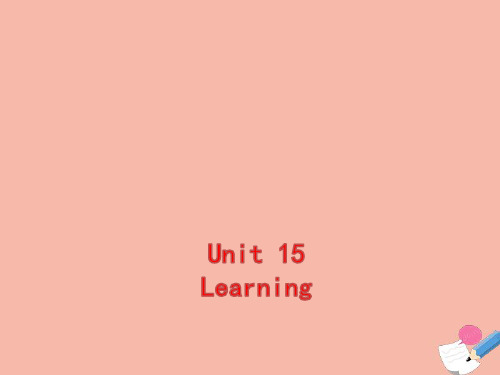
2.backwards b.empty,with nothing written,printed or recorded on it
3.secure
c.likely to continue or be successful for a long time
4.blank
d.to put a mark next to an item on a list,an answer,etc.
an easier life now.
5. Had I taken (take)his advice,I would not have failed
the exam.
一二三四五六
五、阅读课文“The Importance of Life-long Learning”,回答下列 问题。 1.Which of the following is NOT true about Sun Wen according to the passage? A.She went to Qinghua University right after graduation from high school. B.She must be an employee working during weekdays. C.She took her courses in the evenings and on weekends. D.She hasn’t got a Bachelor’s Degree in Computer Engineering by distance learning yet. 答案:A
英语:Unit15《Learning》-Lesson-4-课件(1)(北师大版必修5)
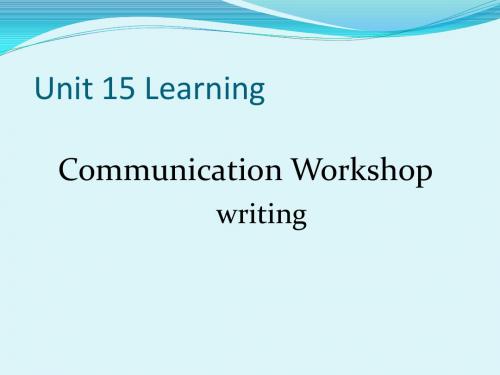
Conclusion: In conclusion
But, however So that
Purpose:
Practice: P86 Ex.1 linking words
You must have known how to write a personal essay now, so let’s have a try!
Alternative Schools Traditional Schools
Reviewing: talk about the differences
between traditional and alternative schools
Traditional Schools
Teachers Students
Evaluation (评价)
aspects ideas layout Your evaluation Excellent Good Acceptable Excellent Good Acceptable
评价人
language
Find some words, expressions or phrases you like.
Word bank
Traditional Schools
strict boring drills conservative test-focused obey slight loose conduct punishment
Alternative Schools
All kinds of Schools
Alternative Schools
Classroom learning
Tests
Traditional Schools
英语:Unit 15《Learning》Communication Workshop课件(1)(北师大版必修5)

Studen t A
the biggest advantage
the biggest disadvantage Cost a lot of money
B
Live independently from the family
Unit 15 Learning
Communication Workshop
speaking
Objectives:
By the end of today’s class, we will be able to • Express and exchange views. • Have a debate on the advantages and disadvantages of studying abroad.
Pre-listening: Voice your opinion
Work with your partner and discuss: • After graduating, will you study abroad? Why or why not?
Listening: task 1: listen and complete the table
Talkback: Assess your performance in the debate
• • • • • Express your views in the debate Ask others to express their views Your contributions are relevant to the topic Never interrupt any of the speakers Express your agreement and disagreement with any of the speakers
英语:Unit 15《learning》Lesson 3 Teachers课件(1)(北师大版必修5)

• I should have called him.
How to use should to express regrets • (present) should + do
• (past) should + have done • Ex 5 P41
Practice
• Ex7 P41
1. I wish I had learned to play the guitar. 2. I wish I hadn’t grown so tall. 3. I wish he hadn’t been given a driving license. 4. I wish I could prepare a family dinner for twelve people.
Practice
• Ex7 P41
5. We wish we weren’t so popular. 6. I wish I could become a spy. 7. I wish I had a similar one. 8.1
Practice
You’ve eaten too much and Now you feel sick.
I wish I hadn’t eaten so much.
Practice
1. When you were younger, you didn’t learn to play a musical instrument. Now you regret this. I wish I had learned to play a musical instrument. 2. You’ve painted the gate red. Now you think that it doesn’t look very nice. I wish I hadn’t painted it red.
北师大版高中英语必修五Unit 15《Learning》(Lesson 4)ppt课件1

课前自主学习
课堂互动探究
Ⅲ.句型搜索
1.It is not surprising that people wanted to believe these a ncient views as they had been put forward by the great philosoph er Aristotle. [信息提取]It is +adj+that...,it是形式主语,真正的主语 是that引导的主语从句。 [例句仿写]他不可能会及时到这儿。 It ___ is __________ impossible ______he that ___ will be here in time.
(1)The steps of acquiring knowledge are______. A
①put forward questions ③find answers A.①②③④ ②observe and study the facts C.①③②④ ④test the answers to find the right ones B.②④③①
课前自主学习
课堂互动探究
Defence n.the act of protecting something or someone 5.________ from attack ignore vt.to behave as if you had not heard or seen so 6.________
督促某人干某事 7.urge sb to do sth________________ 把某人投入监狱 8.put sb into prison________________
感觉起来像,喜欢 9.feel like__________________ 换句话说 10.in other words________________
高中英语Unit15LearningSectionⅥLanguagePoints(Ⅲ)课件北师大版必

Ⅱ.拓展词汇
1.a_c_q_u_ir_e__ vt.获得,得到→acquisition n.获得;所获之物;采
集
2._r_e_li_g_io_n__ n.宗教→religious adj.宗教的;虔诚的;严谨的;
信奉宗教的
3.defend v.防守;防护;辩护→_d_e_f_en_c_e_ n.保卫,保护 4.willing adj.情愿的,乐意的→_u_n_w_i_ll_in_g__ adj.不情愿的
因为这些观点是伟大的哲学家亚里士 that...
__th_a_t____ a man
多德(384—322 BC)提出来的,人们愿
like that was
意相信这些古老的观点,这也不足为
elected.
奇。
2.Why did Aristotle assume that the sun moved around the Earth? assume 为什么亚里士多德认为太阳绕着 that... 地球转?
be ignorant of/about sth. 不知道/没有意识到某事
(2)ignorance n.
无知;愚昧;不知道
be in ignorance of/about sth. 不知道某事
①I said hello to her,but she ignored me completely. 我向她打招呼,可是她根本不理我。
others.
4.The c_i_v_il_iz_a_ti_o_n_(文明) of mankind has taken thousands of years. 5.We're trying to _in_s_p_ir_e__(激励) him with confidence. 6.We don't _a_c_q_u_ir_e_ knowledge from reading alone. 7.It is a present highly _w_o_r_th_y_ of their attention. 8.The forest will act as a _d_e_fe_n_s_e_ against desert dust. 9.The whole theory rests on a wrong _a_s_su_m__p_ti_o_n_. 10.We cannot afford to i_g_n_o_re__ the lessons of the past.
- 1、下载文档前请自行甄别文档内容的完整性,平台不提供额外的编辑、内容补充、找答案等附加服务。
- 2、"仅部分预览"的文档,不可在线预览部分如存在完整性等问题,可反馈申请退款(可完整预览的文档不适用该条件!)。
- 3、如文档侵犯您的权益,请联系客服反馈,我们会尽快为您处理(人工客服工作时间:9:00-18:30)。
Unit 15 LearningWarm-upTapescriptDave: I write down new words several times on paper. This helps my spelling, too. Oh, and I also draw little pictures in my vocabulary book, you know, for “fur” I'd maybe draw a fur coat. And I also imagine the pages of the textbook in my head, you know, photos might help me remember a few words, or even grammar structures.Luning: I can't remember vocabulary very well. If I have to learn a lot of words, I just repeat them aloud to myself, again and again, till I can remember them well enough to spell them backwards even. Sometimes one word makes me think of another, in the list. I also go over the corrections that my teacher makes in my schoolwork.Tonghuan: Mm, it's hard to say. It depends on the words, but I often sort of simplify a word by breaking it up into different parts, you know, like “entertain-ment”, and this helps me understand how they fit together. Sometimes a word sounds similar to another word in Chinese, which helps me remember it.Xiaofang: This may sound silly, but I have a jar in my room. I write translations of new words on bits of paper and put them in the jar. After a week, I open the jar and see if I can remember the words in English. AndI write translations in my vocabulary book and ask my mum to test me. And sometimes I test myself on my way to school. You know, I say things in English to myself!Lesson 1 Life-long LearningThe Importance of Lifelong LearningNowadays, more and more people of various ages and backgrounds are continuing to study to improve themselves. Here's what they have to say about their life-long learning experience.Sun Wen –28 years old “It's never too late to learn.” That was the advice I got after I failed my college entrance exam. Now I'm about to graduate from the School of Continuing Education at Qinghua University with a Bachelor's Degree in Computer Engineering by distance learning. Because of my new qualification, I'm getting promoted at work.In the past, if someone like me had failed to get into university through the college exam, he would have had no chance of getting a degree. But it's different now. I decided to give myself a second chance by studying for a degree in the evenings and on weekends while keeping a secure full-time job. Frankly speaking, the last four years have been hard work, but it's been worth it!Ms Tang – 45 years oldThree months ago, when my manager told me that I would be laid off, my mind went blank and my heart swelled with anger. In the past, if someone had worked for a company for over 20 years, they would have stayed there until retirement! I suspect that they laid me off because the company was not doing that well but it still brought a lump to my throat and made me want to cry. I felt as if I had done something wrong! I know this isn't true though. It's just the status of the job market at the moment.At first, I enjoyed being a full-time housewife and called myself “CHO” or “chief home officer”. But soon I got bored and decided to do a business course. I have always dreamed of starting my own company.I have nearly finished the course now and it has been very helpful. I have learnt so many new skills and have already prepared a business plan for setting up my own export company! I think that getting laid off will prove to be the best thing that ever happened to me.Grandpa Chen – 75 years oldI'm sure you all know the saying, “You can't teach an old dog new tricks.” Well, it's certainly not true! I'm an old dog, and I'm teaching myself new tricks every day!It all started a few months ago when postage went up. I'd been sending letters by airmail to my daughter in the US once a week, but, suddenly, it was too expensive. I decided that it was time I became an Internet user. I got my grandson to instruct me on how to email and usethe Internet and I really enjoy the speed at which my messages get sent and answered. And aside from emailing, it's fun to see and talk to my grandchildren in the US on the i-Cam. In the past, if I'd wanted to see them, I would have had to visit them in person.So many people think that after you retire, all you can do is switch off your brain and bury everything you've ever learnt. This is so wrong!Anyway, it's time for me to go now. I have to practise the alphabet! I'm doing an English course on the Internet.TapescriptOne morning, Bill was standing in his corn field shouting angrily at his neighbour's cattle. Somehow, the cattle had broken through the fence and were now happily eating his corn. Bill tried to get them away but it was no use. What difference did it make? If the frost didn't ruin the harvest, then it was disease.And if it wasn't disease, then it was his neighbour's cattle. Why did he choose to be a farmer? He could have been a banker like his friend Jack! Bill stared at the surrounding countryside for a while and then started up the steep hill to the farm house. He could have made lots of money like Jack and lived in a great flat in the city. And he would never have had to worry about whether his neighbours' cattle were eating his grain if he had chosen to be a banker! Bill chewed his lip as he walked into his kitchen and wiped the mud off his shoes.Suddenly he noticed someone sitting at the table. It was Jack!“What are you doing here?” he asked. “What's the matter?” Jack sighed and put his head i n his hands. “I've quit my job and want to stay here with you for a while. I'm tired of the pollution in the city and the stress of my job. I work all the time and never get to see trees or grass! I wish I'd chosen to be a farmer like you!” Bill smiled. “H ere are some words of wisdom for you, Jack. Do you know this idiom? The grass is always greener on the other side.”Lesson 2 Different SchoolsTapescriptMrs Liu: Most of you have met Jack and Nicholas – our exchange students from the UK. I've asked them to talk to us this afternoon about their learning experiences in the UK. Jack, let's start with you. Can you tell us about the kind of education you had? Jack: Good morning, everyone. I guess I had quite a traditional education. By “traditional” education, I mean that there were lots of rules. It was very strict! They didn't allow even the slightest loose conduct. The school was founded in 1896 and it's very proud of its reputation. The teachers were always telling us to do something – even little thing s... ‘Do this! Do that! Hurryup! Slow down!' There were so many rules at that school and we had to obey them at all times!Mrs Liu: I see. But what about the classroom learning itself?Jack: Oh, I guess it was traditional, too. However, I think we had excellent teachers. In class, teachers would give lectures and we took a lot of notes. We had to review the notes after class and remember some texts. We had to put up our hands and stand up straight to answer the teacher's questions. Also, we had a lot of homework to do after school. Everything we studied would be tested. Even now, I can remember some of the texts and poems we learned.Mrs Liu: That's very interesting, thanks, Jack. Nicholas, can you describe the kind of schooling you had?Nicholas: Sure. My school is very different from Jack's school. My school only started in 1967 and it isn't traditional, you know, or conservative. The school motto is “making our school fit for every child” — that means it cares for every student and it recognises that we all have different learning needs and learning styles. Our teachers were all very mild and kind-hearted. They were very patient with each of us and they were not very strict. They did not like to hand out punishment at all.Mrs Liu: Can you tell us what learning was like in the classroom?Nicholas: Well, we were never treated simply as receivers of knowledge and asked to memorise the texts. Instead, we took an activepart in learning and were involved in a lot of reading, writing and problem-solving activities. We were allowed to work at our own pace, and we could ask questions whenever we wanted. We didn't wear uniforms and the teachers didn't always tell us what to do. They used different types of learning activities and made each subject as interesting as possible. To check what we had learned, they seldom gave us tests but encouraged us to do lots of project work and interesting assignments. I think my school took a learner-centred approach to teaching.Mrs Liu: I see. What do you think about your school?Nicholas: For me, it was great. I don't think I could have studied at Jack's school.TapescriptMrs Liu: Is this kind of learner-centred approach popular in the UK?Nicholas: Not really. I don't think it's as popular as it used to be in the 1970s. Now the competition to get selected for university is much greater and a lot of parents see traditional, strict schools, like Jack's, as giving students the best chance. But I think that this approach prepares us better for university and real-life because we learn about our own learning styles.Mrs Liu: Do you agree with that, Jack?Jack: Well, to a certain extent, yes, but I can't really say because I only know my type of school. One of the problems I've heard about the sort of alternative school Nicholas goes to is that students don't prepare well for tests.Nicholas: I'm sorry to disagree, Jack, but I don't accept that at all. I think many people misunderstand and believe that the learner-centred approach isn't as good as the traditional method. That just isn't true. We used to practise doing exams but we were also taught how to study more independently. Research shows that we do just as well as students from traditional schools.Jack: Well, maybe you're right. Our lessons were very structured, and we were tested on the content, the facts – we weren't taught how to analyse or think about something on our own. I guess I would have preferred your type of school.Nicholas: Not necessarily. It doesn't suit all students. You may not have liked it, Jack.Jack: You might be right but I would've liked to try it!Mrs Liu: That is all very interesting – perhaps we can talk about it again later. Thank you both for sharing your experiences with us.Lesson 3 TeachersMy TeacherGraham Lawrence, 29, science author who gives presentations on TV, went to Overton School, 1981-1989.I haven't seen Mr Jenkins since I left school but I often think about him. I wasn't very good at most school subjects. I suppose I was a bit lazy and now I wish I'd done more work, especially in maths. The only thing I can remember from school maths is that the angles of a triangle add up to 180 degrees! But when I was 15 and went into Mr Jenkins' class, I really became interested in a subject for the first time.Before Mr Jenkins, science had simply been a subject full of strange words to me. I had no idea what an atom was and I didn't really want to know either! I found it all so boring and difficult. But Mr Jenkins made everything interesting. He used to explain things with lots of practical examples and simplified things that seemed difficult. One day, he took us outside and we built a rocket! I remember that he let me pour some powder into the rocket and then another student lit a flame to set it off. It was great fun.I know that I wasn't a willing student and I shouldn't have been so difficult at school, but it was probably because I lacked confidence in myself. Mr Jenkins made me feel that I could do things. I was interested in astronomy and he asked me to give a presentation to the class. That was really the first time I ever tried to explain science to an audience andnow it's my job! Often when I'm preparing a programme, I think about how Mr Jenkins would have done it. Sometimes I wish I could phone him and ask for his opinion!My StudentBrian Jenkins, science teacher at Overton School. Before Graham came into my class, he was very difficult. I had heard stories about his bad behaviour. Once I caught him and a friend seeing who could spit the furthest off the school stage! But when he got interested, he changed. The first day he walked into my class, he was dragging his school bag behind him and looking bored, but as soon as I set up an experiment to show how the human stomach works using acid and an onion, he gave me his full attention. He loved science! He was very bright and should have done much better in all his other subjects. I've read a couple of his books and seen him on TV. I always say to my wife, “Oh look, I used to teach him!”I wish I was as successful with all my students as I was with Graham.It's difficult teaching nowadays. There are lots of problems and not enough money. The government should have put more money towards science education. And I wish they would decrease the size of classes —it's not easy doing lessons in laboratories with big groups and it must be even worse in the poorer schools! At least with schools like ours, we have laboratories!My wife often wishes that I had chosen a job with less stress but I love what I do. The thing about being a teacher is that you have access to children's minds when they are open and eager to learn. And if what I do as a teacher can help turn a child like Graham into such a successful adult, then I know what I'm doing is worthwhile.Lesson 4 Understanding“Who questions much, shall learn much, and remember much.”– Francis Bacon (1561–1626)It seems obvious now how we acquire knowledge and understanding. To start with, you need questions. Then, to find answers, you observe the world around you and study the facts. After that you consider possible answers and test each to find the right ones. Although today we are more accustomed to typing a few key words into a search engine and waiting for the Internet to spit the answer out for us, modern scientists and thinkers are still solving the world's problems with this type of analysis — luckily for us.However, in the 17th century when Francis Bacon suggested that this type of thinking was the way to gain knowledge, he was going against the views of the day. Bacon held an important rank under King James (1566–1625) of England but his true interest was not the day to day bureaucratic details of the government, but the worthy search for knowledge. This was certainly not the interest of most people in his day. At that time, people believed more in religion than in facts and people like Galileo Galilei (1564–1642), who proved scientific ideas such as “the Earth is not the centre of the universe”, were often punished by the church with no one coming to their defence. The church and many people tended to ignore the facts and were unwilling to challenge what they had always comfortably believed. They preferred to make assumptions about the world based on the experience of others. In fact, when Galilei proved that the Earth was not the centre of the universe, instead of believing him, people chose to believe views that were almost 2000 years old!It is not surprising that people wanted to believe these ancient views as they had been put forward by the great philosopher Aristotle (384–322 BC). He said that the Earth must be the centre of the universe because it felt like the Earth was standing still. Galilei disagreed. At first, people approved of his studies and urged him to continue, but later when he proved Aristotle wrong, they grew angry and put him in prison. They didn't want to challenge what they'd always thought was true.This also shows how people didn't want to search for their own understanding or educate themselves. And this is still often true today. People feel that if someone important and respected says that something is right, then it must be so. But even though Aristotle was a great man who inspired many great scientistsand philosophers after him, he was wrong at times. And Galilei too made mistakes. He is now known as the father of astronomy but he believed that the earth moved round the sun in a perfect circle. He was wrong.Therefore our understanding of the world around us is constantly growing and changing. In other words, we learn more every day and none of us can ever sit back and say, “We know it all”. We need to thank the great men of the past for the wisdom to know that we don't know it all and probably never will, for that would mean a world without questions.So much of our knowledge and understanding of the world today is due to people like Bacon and Galilei, who were brave enough to step out from the shadows of conventional thought in order to find the kingdom of knowledge that today's civilisation is built upon. These men knew that knowledge and understanding are things to fight for; more vital to a man,and more beneficial to mankind, some might say, than all the money in the world.“All truths are easy to understand once they are discovered; the point is to discover them.”TapescriptMan: Well, I went to a traditional British public school. I left four years ago. The school is in the city. It has about 700 students, and it's mostly a boarding school. There are lots of facilities for sport – tennis courts, swimming pool, that sort of thing. There are also good science laboratories and lots of computers. The classes are small, so if you fall behind with your work the teacher will go over it with you. It may have changed now, but we did a lot of subjects and we even had lessons on Saturday mornings! We had some free afternoons when we could get together. They gave us lots of homework and we had tests all the time. I remember that after-school clubs were quite popular. I was in a drama club – we once put on a performance of Hamlet – and I also set up a school radio station! There were lots of rules and discipline was strict. We could only leave the school grounds at certain times, and we had to wear a uniform. I didn't get into trouble very often, but one of my friendsdid. He got punished a lot – he wasn't allowed to go out at the weekend, and once he was sent home for three weeks.Woman: My school was very different from most schools. It was in a lovely old house in a forest. There were only sixty pupils. There weren't many facilities, but there was a good library if you wanted to look up information or catch up with your work. You won't believe this, but we didn't have to go to lessons! And there was no homework or tests, or anything like that. We could do what we wanted – if we felt like it, we could play all day. If we wanted to study, we just went to the teachers and asked them to help us. At first, I did nothing, I put off studying for weeks! Then I got interested in science and computers, and I studied science with a teacher who I got on with. I liked it so much that now I'm studying engineering at university and I want to go on to do further research. There were lots of other activities at school you could take up if you wanted –sports, painting and acting. I guess the best thing was that we were free, and the school was democratic. Everything was decided at school meetings, and everyone could vote – each student had the same vote as the teachers. We decided all kinds of things – we even selected the teachers! And discipline, well, we all decided on rules and punishments when one of us did something wrong. A lot of people don't believe me, but it worked really well.。
